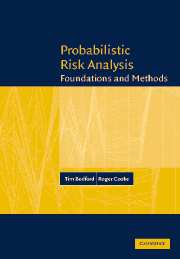Book contents
- Frontmatter
- Contents
- Illustrations
- Tables
- Preface
- Part I Introduction
- Part II Theoretical issues and background
- Part III System analysis and quantification
- 6 Fault and event trees
- 7 Fault trees – analysis
- 8 Dependent failures
- 9 Reliability data bases
- 10 Expert opinion
- 11 Human reliability
- 12 Software reliability
- Part IV Uncertainty modeling and risk measurement
- Bibliography
- Index
10 - Expert opinion
from Part III - System analysis and quantification
Published online by Cambridge University Press: 05 June 2012
- Frontmatter
- Contents
- Illustrations
- Tables
- Preface
- Part I Introduction
- Part II Theoretical issues and background
- Part III System analysis and quantification
- 6 Fault and event trees
- 7 Fault trees – analysis
- 8 Dependent failures
- 9 Reliability data bases
- 10 Expert opinion
- 11 Human reliability
- 12 Software reliability
- Part IV Uncertainty modeling and risk measurement
- Bibliography
- Index
Summary
Introduction
Probabilistic risk analysis treats events with a low intrinsic rate of occurrence, and large amounts of data are seldom available. Since its inception, expert opinion in the form of subjective probabilities has been a dominant source of data for failure probabilities. Two sources for data in risk analysis, WASH-1400 [NRC, 1975] and IEEE Standard 500 [IEEE, 1977], are based on unstructured surveys of expert opinions. The IAEA data base, the COVO study [COVO, 1982], and the Canvey Island reports [HSE, 1978, HSE, 1981] reference most data to these two sources. The Swedish T-Book uses Bayesian methods in combination with operational data to derive uncertainty bounds for failure rate assessments. The USNRC made extensive use of structured expert opinion surveys to quantify uncertainties in the NUREG 1150 study [NRC, 1989].
This chapter focuses on the mathematical background for utilizing expert subjective probabilities. It draws on Chapter 11 of [Cooke, 1991], to which source the reader is referred for more detail on the use of expert opinion in general.
Expert judgement techniques are useful for quantifying models in situations in which, because of either cost, technical difficulties or the uniqueness of the situation under study, it has been impossible to make enough observations to quantify the model with ‘real data’. Expert judgement data may also be used to refine estimates from ‘real data’ when it turns out that the categorization of the data was not as fine as the models require.
- Type
- Chapter
- Information
- Probabilistic Risk AnalysisFoundations and Methods, pp. 191 - 217Publisher: Cambridge University PressPrint publication year: 2001
- 1
- Cited by



